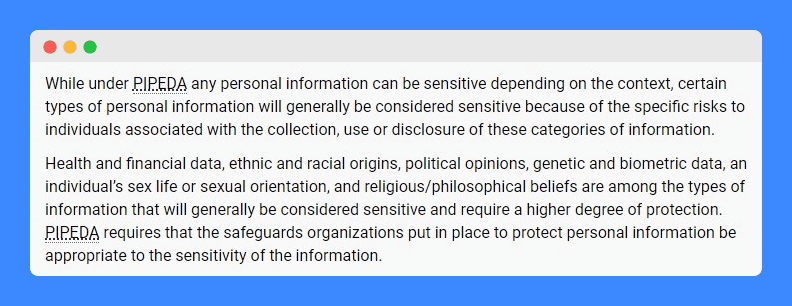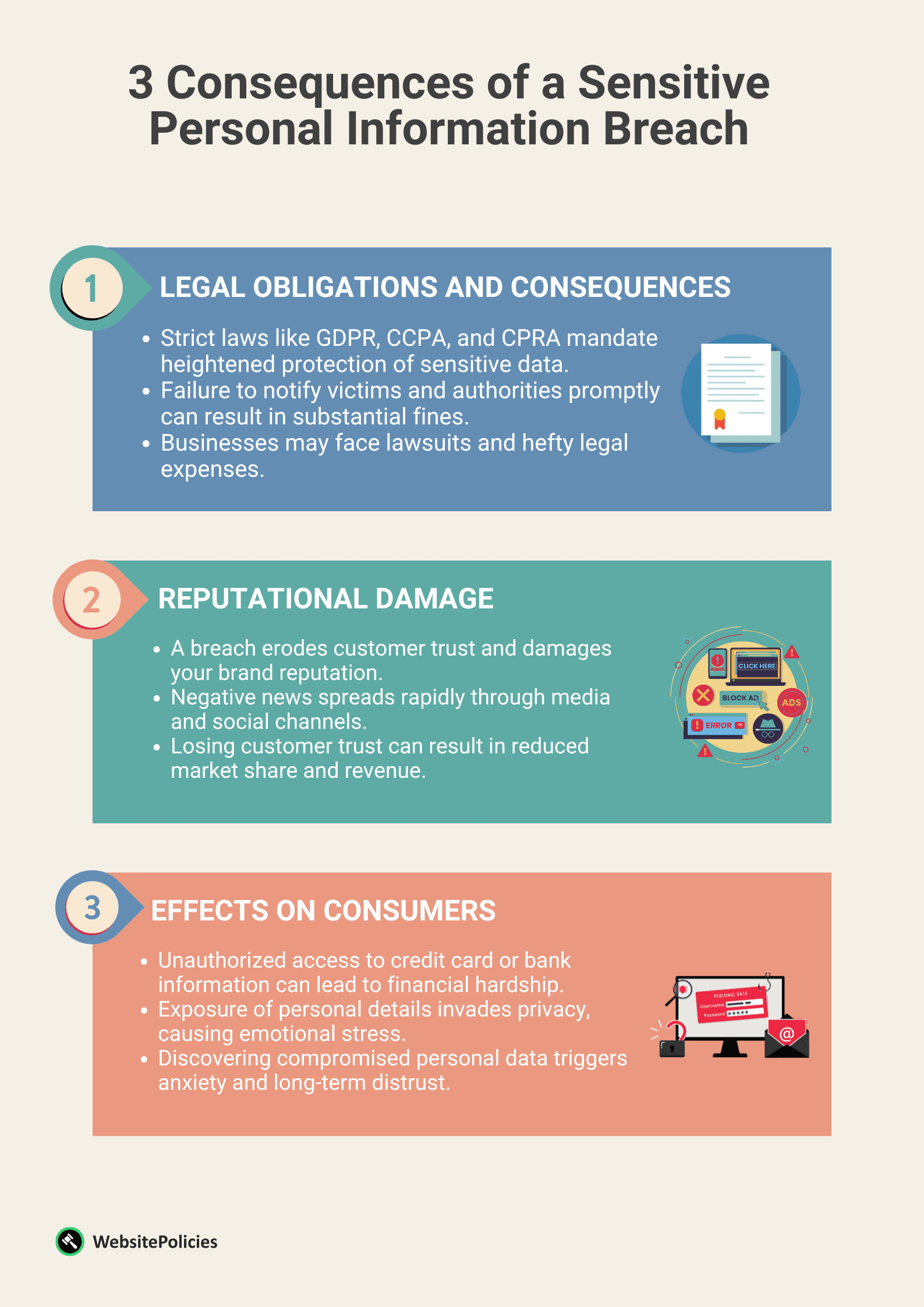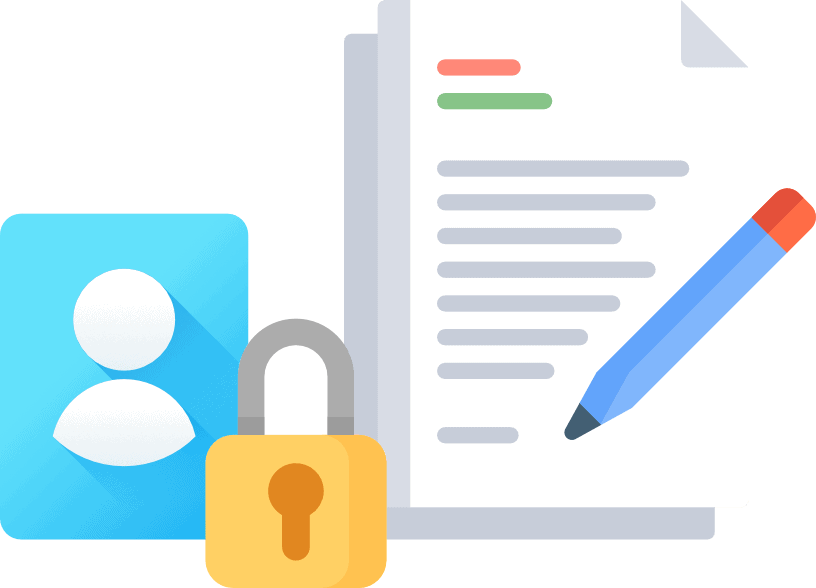In an increasingly digital world, the protection of sensitive personal information is not just a legal obligation but a moral imperative. Imagine a world where your medical records, financial details, or biometric data are exposed to the prying eyes of cybercriminals.
Such scenarios underscore the critical need to understand what sensitive personal information entails and the stringent protective measures it requires.
In this article, we’ll explore the definition of sensitive personal information, the legal landscape surrounding it, and essential measures for keeping it safe.
- Sensitive personal information (SPI) includes data like medical records and financial info, requiring strict protection.
- GDPR, CPRA, and PIPEDA define and protect SPI, emphasizing encryption and valid reasons for processing.
- Neglecting SPI protection leads to legal liabilities, reputational damage, and loss of customer trust.
Table of Contents
PRO TIP: Take the hassle of writing your own privacy policy away with our privacy policy generator trusted by over 200,000 businesses. It’ll save you hours of work and possible costly legal mistakes.
What is Sensitive Personal Information?
Sensitive personal information (SPI) constitutes a distinct category of personal information that must require increased protection owing to its potential to inflict harm or distress on an individual if disclosed without proper authorization.
This category of personal data includes a wide array of confidential details such as Social Security numbers, financial records, medical information, and any data that could be exploited to identify or track an individual, demanding heightened protection under privacy regulations.
When it comes to the definition of sensitive information, unlike public information, it is not collected from easily accessible sources and doesn’t include data made public through government records.
While various privacy laws may define personal information differently, sensitive personal information is universally recognized for its capacity to expose an individual to risks such as cyberstalking, financial loss, identity theft, or discrimination.
PRO TIP: Sensitive personal information is the most fragile and potentially hazardous type of data your business may handle, making its proper protection an ethical duty and a legal obligation.
Personal Information vs Sensitive Personal Information
Personal information is data that can identify an individual, this includes names, email addresses, and even IP addresses. Sensitive personal information, on the other hand, refers to a subset of personal information that has higher stakes involved, such as Social Security numbers, financial information, or medical records.
In legal landscapes like the GDPR in Europe or the CCPA in California, the two categories are not treated equally.
Sensitive data invites stricter regulations and more severe penalties for mishandling. For you, failing to distinguish between the two is not just risky; it could be legally untenable.
This isn’t some mere nuance; it’s a regulatory stipulation that directly impacts your data collection and management processes. Know the difference; it’s not just smart — it’s required.
Types and Examples of Sensitive Personal Information
Sensitive personal information covers a broad range of deeply personal information that requires special care. Let’s go over the different types of data that are generally considered sensitive:
- Racial or Ethnic Origin: This is all about a person’s roots – where they come from, their cultural background, and the things that make them unique. For instance, knowing that a customer is of Asian descent or from a specific ethnic community falls under this category.
- Political Opinions: This is information that can identify a person’s political preferences and what they believe in politics.
- Religious or Philosophical Beliefs: This information includes an individual’s religious faith, spiritual beliefs, or philosophical convictions.
- Trade Union Membership: This reveals if someone is part of a labor union or similar groups that protect workers’ rights.
- Genetic Data: This is all about the secrets hidden in our genes – it can tell us about potential health risks and family history. If a customer undergoes a genetic test and shares the results with your business, it’s sensitive data.
- Biometric Data: Think of this as high-tech stuff, like fingerprints or facial recognition, used to identify someone securely. If your business uses fingerprint scans for access, that’s sensitive personal data.
- Health-Related Information: This covers the intimate details of a person’s physical and mental health, including their medical history and any treatments they’ve undergone.
- Sexual Orientation: This pertains to data revealing a person’s sexual preferences or orientation, which is very private and reveals personal aspects of their identity.
- Criminal Records: It encompasses information about an individual’s encounters with the law, including any convictions, legal proceedings, or interactions with law enforcement.
- Financial Information: This is data relating to financial aspects of a person’s life, including sensitive details such as credit card numbers, bank account information, and financial status, considering assets and debts.
- Access Credentials: This includes passwords, credentials, and any information that may grant access to an account.
These categories of sensitive personal information are typically subject to stricter legal protections. Handling them carefully is essential to prevent potential misuse or unauthorized disclosure.
What Is Not Considered Sensitive Personal Information?
While sensitive personal information demands stringent protection, not all data falls into this category.
Distinguishing between personal and sensitive personal information enables you to determine the necessary protection for a particular kind of data.
Here is a list of data that typically does not qualify as sensitive personal information:
- Basic Contact Information: This includes names, addresses, and phone numbers, which are generally considered non-sensitive.
- Publicly Available Information: This is data that is publicly accessible, such as business contact information or information found in public records.
- Business Information: This pertains to information related to an individual’s job, such as job titles and work contact information,
- Educational Data: These are basic details about an individual’s education, such as degrees earned or schools attended.
- Anonymized or Aggregated Data: Anonymized data is information that’s been changed so much that it can’t be connected to anyone. Meanwhile, data is considered aggregated when information from many people is combined and studied as a group.
- Non-Personal Data: Data that does not pertain to an individual, such as general statistics or anonymous user behavior on websites, is not sensitive.
How Data Privacy Laws Define and Protect Sensitive Information
Data privacy laws exist to regulate how organizations handle sensitive data, ensuring it is protected from unauthorized access and usage.
One key aspect of these regulations is the definition and protection of sensitive information.
Understanding what qualifies as sensitive data and how it is shielded under the law is very important for your business. In this section, we will explore how data privacy laws define and provide protection for sensitive information.
GDPR
Per the GDPR, sensitive information is a category of personal information that shouldn’t be processed unless it falls under certain exemptions. Also, GDPR mandates that for your business to collect and use sensitive information, it’s very important first to establish a valid reason for processing that particular data.
The screenshot below shows how GDPR legally defines sensitive data:

Specifically, under the GDPR, the following are considered sensitive information:
- Race or ethnicity
- Religious or philosophical beliefs
- Genetic data
- Biometric data
- Health data
- Political opinions
- Trade union membership
- Sexual orientation and sex life
The GDPR strictly prohibits the processing of sensitive information unless the data subject has already made their sensitive data public, along with a few other conditions:
- Consent: You can process sensitive information once a data subject has already given their explicit permission
- Legal Obligations: When data processing is needed for employment, social security, or legal obligations.
- Protecting Vital Interests: When processing the data, protecting someone’s life or the life of someone who can’t consent is necessary.
- Non-Profit Organizations: For nonprofits with specific aims, but only for members, and with their consent.
- Legal Claims: When processing is necessary for legal claims or court-related matters.
- Public Interest: If substantial public interests are involved, as long as individuals’ rights are protected.
- Health and Medicine: Regarding health matters, like medical diagnoses or public health interests.
- Archiving and Research: For archiving, scientific research, or statistics, as long as it serves the public interest.
If you’re collecting sensitive personal information under GDPR, it’s important to store it securely, as recommended by Article 32 of the law.
This means pseudonymizing and encrypting the data, ensuring it remains confidential, intact, and available. You should also have a plan for quick data recovery in case of an incident.
PRO TIP: Make sure to outline the legal basis for collecting sensitive categories of data and the security measures in your GDPR-compliant privacy policy.
CPRA
The CPRA defines sensitive information as a list of personal data that includes the following:
- Personal details like social security numbers, driver’s license numbers, and passports
- A consumer’s account login, financial account, debit card, or credit card number, in combination with any required security or access code, password, or other credentials for account access.
- Precise geolocation data
- Information related to race, religion, philosophy, or union membership
- Contents of private communications, excluding those intended for the business
- Genetic data
- Biometric information for unique identification
- Data concerning a consumer’s health
- Consumer’s sex life or sexual orientation
Consumers hold significant power under the CPRA, and as a small business owner, you need to understand their rights, as detailed in section 1798.121 of the law. One of these rights is opting out of selling or sharing their sensitive personal information.
This means that if your business sells or shares sensitive information, consumers have the right to request that you stop this practice in relation to their information. It’s a fundamental aspect of the CPRA, designed to give individuals more control over how their sensitive data is utilized.
It’s also important to disclose any financial incentives tied to consumer data. Importantly, you can’t force consumers to create accounts to exercise their rights, and you must stop selling data once they opt out.
PIPEDA
Canada’s federal data privacy law is PIPEDA, or the Personal Information Protection and Electronic Documents Act. Its primary purpose is to govern how organizations handle and utilize personal information, including sensitive data.
In 2022, the Office of the Privacy Commissioner of Canada (OPC) released an Interpretation Bulletin that goes into the concept of sensitive information within the framework of PIPEDA. This bulletin provides invaluable insights, emphasizing that PIPEDA follows a contextual approach.
Any data piece could be classified as sensitive depending on the context surrounding its use and storage. For more in-depth information, please refer to the screenshot below, which highlights key details from the bulletin.

The Interpretation Bulletin issued by the OPC offers essential clarity on the types of information typically categorized as sensitive and, therefore, demands heightened security and safeguarding measures. These include:
- Health data
- Financial data
- Ethnic or racial origins
- Political opinions
- Genetic data
- Biometric data
- Sexual orientation
- Religious beliefs
- Philosophical beliefs
If your organization collects sensitive information about Canadian individuals and falls under the jurisdiction of PIPEDA, it is imperative to adhere to the ten fair information principles mandated by the law.
Additionally, you must implement extra measures to ensure this data’s secure and appropriate handling and storage.
Common Ways Sensitive Personal Information Gets Compromised
Considering the vulnerable nature of the data, protecting sensitive information should be a top priority for small business owners in today’s digital world.
To enhance your data security and safeguard your business’s sensitive information, it’s important to be aware of the common methods that pose a risk.
- Phishing Attacks: Cybercriminals impersonate trusted sources to trick employees into revealing sensitive information like login credentials or financial data. Phishing attacks are widespread and highly effective.
- Data Breaches: Hackers infiltrate your business’s databases or systems, potentially exposing large amounts of sensitive information. Data breaches can lead to reputational damage and financial losses.
- Malware and Ransomware: Malicious software can infect your business’s devices, giving hackers access to sensitive data and potentially encrypting critical files until a ransom is paid.
- Insider Threats: Insiders with authorized access to your systems and databases may misuse their privileges to steal sensitive business data. This category includes employees, contractors, or anyone with legitimate access to your data.
- Man-in-the-Middle (MitM) Attacks: In MitM attacks, hackers intercept communications between your business and others without their knowledge, capturing sensitive information. These attacks often occur on public Wi-Fi networks or compromised routers.
These tactics should be a primary focus when implementing security measures to protect your business’s sensitive information. Understanding and addressing these threats can significantly enhance your data security posture.
By understanding these methods, you can effectively protect your business’s sensitive information and mitigate potential risks. Remember that safeguarding your business’s data is vital for maintaining trust and integrity in your operations.
Consequences of a Sensitive Personal Information Breach
As a small business owner, you may think that data breaches only happen to large corporations, but no one is immune to the threat. And the potential consequences of failing to protect sensitive information may be too damaging for small businesses.

Legal Obligations and Consequences
A breach of sensitive information may have severe legal and reputation consequences.
Strict privacy laws, including the California Consumer Privacy Act (CCPA) and the California Privacy Rights Act (CPRA) in the United States, as well as the General Data Protection Regulation (GDPR) in the European Union, require the heightened protection of sensitive personal information.
If a breach occurs, legal obligations demand swift notification of affected individuals and regulatory bodies, with substantial fines awaiting those who fail to comply.
Moreover, businesses might end up in expensive legal battles as data breach victims seek compensation for their sensitive data being exposed.
Reputational Damage
Beyond the legal consequences, a breach can greatly impact your business’ reputation. Customers rely on your commitment to protect their sensitive information. A breach can shatter this trust completely, leading to a damaged reputation that’s challenging to rebuild.
News of a data breach can spread like wildfire through media and social channels, drawing unwanted attention to your business. Customers may then turn to competitors they perceive as more secure, resulting in a loss of market share.
Effects on Consumers
A breach will also have serious effects on your consumers. Unauthorized use of credit card information or bank account details can lead to financial difficulties.
And exposure of personal and intimate details causes a profound invasion of privacy, and just discovering that their personal information has been compromised can lead to a lot of stress and anxiety for them.
How to Protect Sensitive Personal Information
As responsible business owners, protecting sensitive information should not just be a matter of legal compliance but a moral responsibility to care for and shield your customers’ data from potential breaches.
Here are practical actions you can take to improve your data security measures and essential steps to implement them effectively:
- Encrypt Your Data: Shield sensitive information by employing encryption technologies, ensuring it remains secure during transmission and storage.
- Control and Limit Access: Establish strict access controls to guarantee that only authorized personnel with the required security or access code can decrypt and access sensitive data.
- Educate Your Team: Build a culture of data security by providing comprehensive training to your staff, emphasizing best practices and the significance of sensitive data protection.
- Prepare for Incidents: Develop a robust incident response plan that outlines precise steps to take in case of a data breach, including prompt notification procedures.
- Regularly Audit Your Security: Conduct routine security audits to pinpoint vulnerabilities and take swift action to rectify them, reinforcing your commitment to protecting sensitive information.
Frequently Asked Questions
What is sensitive personal information (SPI)?
SPI includes confidential data like Social Security numbers, medical records, and more, demanding heightened protection.
How does sensitive personal information differ from personal information?
Personal information identifies individuals, while sensitive data, like financial or health data, carries higher stakes, subject to stricter regulations.
What are some examples of sensitive personal information?
Examples include racial or ethnic origin, political opinions, health data, financial information, and biometric data.
What data is not considered sensitive personal information?
Basic contact info, publicly available data, business info, educational data, anonymized or aggregated data, and non-personal data.
How can businesses protect sensitive personal information effectively?
Protect SPI through encryption, access controls, employee education, incident response plans, and regular security audits.



